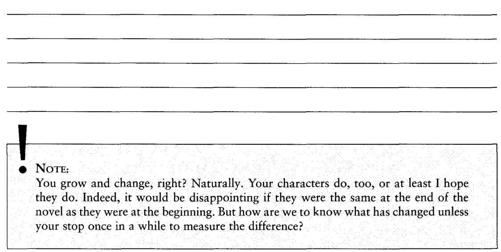Writing the Breakout Novel Workbook (34 page)
Read Writing the Breakout Novel Workbook Online
Authors: Donald Maass

"Are you a female Scholar?" said Lyra. She regarded female Scholars with a proper Jordan disdain: there
were
such people, but, poor things, they could never be taken more seriously than animals dressed up and acting in a play. Mrs. Coulter, on the other hand, was not like any female Scholar Lyra had seen, and certainly not like the two serious elderly ladies who were the other female guests. Lyra had asked the question expecting the answer No, in fact, for Mrs. Coulter had such an air of glamour that Lyra was entranced. She could hardly take her eyes off her.
A day later, Lyra is on her way to London with Mrs. Coulter and their respective daemons, talking animal companions that in Pullman's world are, in effect, the external manifestation of each individual's soul. Lyra's awe deepens:
And now she was on her way to London: sitting next to the window in a zeppelin, no less, with Pantalaimon's sharp little ermine paws digging into her thigh while his front paws rested against the glass he gazed through. On Lyra's other side Mrs. Coulter sat working through some papers, but she soon put them away and talked. Such brilliant talk! Lyra was intoxicated: not about the North this time, but about London, and the restaurants and ballrooms, the soirees at embassies or ministries, the intrigues between White Hall and Westminster. Lyra was almost more fascinated by this than the changing landscape below the airship. What Mrs. Coulter was saying seemed to be accompanied by a scent of grownupness, something disturbing but enticing at the same time: it was the smell of glamour.
Months later, the educated and pampered Lyra learns that Mrs. Coulter is the primary procurer for the General Oblation Board, known among street urchins as the Gobblers because they make children disappear. (Among the missing is Lyra's special friend Roger.) The stolen children are used—hideously, we later learn—in experiments probing the nature of Dust in the arctic North.
Furthermore, Lord Asriel is now captive and being held in the Northern fortress of Svalbard, which is guarded by fearsome armored bears. Lyra runs away. When next she glimpses Mrs. Coulter months later, as a captive among the other kidnapped children in the research facility in the North, her view of her former guardian and her monkey deamon has changed:
[Lyra] jumped down, pushed back the locker, and whispered to Pantalaimon, "We must pretend to be stupid till she sees us, and then say we were kidnapped. And nothing about the gyptians or Iorek Byrnison especially."
Because Lyra now realized, if she hadn't done so before, that all the fear in her nature was drawn to Mrs. Coulter as a compass needle is drawn to the pole. All the other things she'd seen, and even the hideous cruelty of the intercision, she could cope with; she was strong enough, but the thought of that sweet face and gentle voice, the image of that golden playful monkey, was enough to melt her stomach and make her pale and nauseated.
Lyra's dread is deepened by the knowledge, imparted to her earlier, that, in fact, Lord Asriel is her father and Mrs. Coulter is her mother. Pullman thus deepens the significance, and fearsome power, of Lyra's greatest adult ally and enemy.
How does your protagonist's picture of himself change throughout the course of your novel? How does she view others in the story, and how do those views change? How do others see your protagonist? How do those assessments, in turn, alter? Delineate these shifts in your characters' self-perceptions and perceptions of each other. It is yet another way to tighten the weave of the story.
______________EXERCISE
Measuring Inner Change
Step 1:
Find a moment in your manuscript when your hero is speaking with a major secondary character, or when that secondary character carries the point of view while speaking with your hero.

Step 2:
Create a paragraph in which your hero assesses this other character; that is, delineates for himself this other character's qualities, mood, or situation in life. Put simply, how does your hero see this character right now?
Start writing now.

Alternately, have your point of view character regard your hero by the same criteria. How does she view your hero at this particular moment? |
 |
Step 3:
Move forward to a later point in the story when these two characters are again together on the page. Repeat the previous step. How does your hero view this character now?

Alternately, how does that character view your protagonist at this point? |
 |
Follow |
 |
Conclusion:
Allowing characters occasional moments to take stock of each other is a powerful way to mark each player's progress through the story. How have events affected each? Possibly one character sees your hero carrying a load of care, while another imagines that she has never looked so alive. Examine your hero from several points of view; later, show us how those views have shifted.
Setting
How many settings are there in your current novel? From how many points of view is each of them seen? Each outlook on each location is an opportunity to enrich your story. In you novel, how many of those opportunities are you taking?
ow many settings are there in your current novel? From how many points of view is each of them seen? Each outlook on each location is an opportunity to enrich your story. In you novel, how many of those opportunities are you taking?
In Sarah Waters's moody, erotic Victorian novel
Affinity,
fragile Margaret Prior volunteers as a visitor to the female inmates at London's Millbank Prison. Following her first visit, she later recounts her journey through the institution's linked pentagonal buildings in the company of its warden, Mr. Shillitoe:
I had a plan of Millbank's buildings from Mr. Shillitoe a week ago, and have had it pinned, since then, on the walls beside this desk. The prison, drawn in outline, has a curious kind of charm to it, the pentagons appearing as petals on a geometric flower— or, as I have sometimes thought, they are like the coloured zones on the chequer-boards we used to paint when we were children. Seen close, of course, Millbank is not charming. Its scale is vast, and its lines and angles, when realized in walls and towers of yellow brick and shuttered windows, seem only wrong or perverse. It is as if the prison had been designed by a man in the grip of a nightmare or a madness—or had been made expressly to
drive
its inmates mad. I think it would certainly drive me mad, if I had to work as a warder there.
Waters's choice of words for Miss Prior ("wrong or perverse" and "designed by a man in the grip of a nightmare") not only conveys the frightening and oppressive effect that the prison has upon her narrator, but also foreshadows the variety of madness into which Miss Prior herself will slip as the result of her lesbian affair with an inmate. The psychological effect of the place upon Miss Prior is striking—or is it perhaps more that Miss Prior is projecting her apprehension of her own fearful inclinations upon the place?
A place also can lift spirits as well as sink them, as South Carolina novelist
Dorothea Benton Frank shows in her debut novel
Sullivan's Island.
As I discussed in an earlier chapter, the book tells the story of Charleston real estate executive Susan Hayes, who retreats to her family's summer home on Sullivan's Island following the discovery that her husband is having an affair: